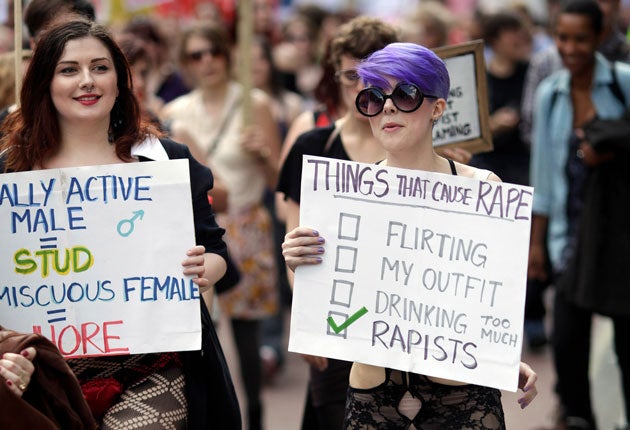We must do more to fight sexual harassment at university
A recent NUS study found that 50 per cent of students believe sexual harassment to be rife on UK campuses. We all need to be doing much more to stamp it out, says Layla Haidrani

Your support helps us to tell the story
From reproductive rights to climate change to Big Tech, The Independent is on the ground when the story is developing. Whether it's investigating the financials of Elon Musk's pro-Trump PAC or producing our latest documentary, 'The A Word', which shines a light on the American women fighting for reproductive rights, we know how important it is to parse out the facts from the messaging.
At such a critical moment in US history, we need reporters on the ground. Your donation allows us to keep sending journalists to speak to both sides of the story.
The Independent is trusted by Americans across the entire political spectrum. And unlike many other quality news outlets, we choose not to lock Americans out of our reporting and analysis with paywalls. We believe quality journalism should be available to everyone, paid for by those who can afford it.
Your support makes all the difference.Sexual harassment at university: it’s not something most students believe will occur, when packing their bags for a few years of further education. Yet worryingly, harassment, whether it takes place at the SU bar, that club off campus, or even through social networking sites, is an unfortunate part of many female students’ experience at university. We don’t talk about it much, but it’s an issue that needs confronting.
As a recent example, who can forget the infamous video of Nick Swain, President of Warwick Students’ Union, publicly unfastening a woman’s bra with a chorus of ‘get your tits out’? If someone in authority, whom many look up to and who is responsible for representing the student body, feels that it’s fine to objectify and degrade a woman, then what hope is there? This one video was only uncovered by accident? How many other incidents are going on unrecorded?
A recent study from the NUS, called That’s what she said: Women students’ experiences of lad culture in higher education, has found that 50 per cent of its respondents believed that sexual harassment were rife and groping in nightclubs was commonplace.
One interviewee states: “I don’t know any of my female friends who haven’t had some kind of encounter that was harassment whether it be verbal or physical since they’ve been at university.” Another said: “it does happen a lot…and it doesn’t just happen to women who are skimpily dressed or young, it happens to all the women on the streets when the students are drunk.”
These studies illustrate effectively that sexual harassment is pervasive in university life. More concerning, it is not the first time the NUS have produced such shocking statistics. The NUS’ Hidden Marks report published in 2010 revealed that 68 per cent of graduates had been sexually harassed at their university campus as a student.
The NUS has linked its origins to the ‘lad culture’ that is celebrated by both male and female students alike on Facebook, on pages like The Lad Bible and Uni Lad. These are undoubtedly playing a pivotal role in shaping the social expectations of male students all over the country. Men are encouraged to reclaim their masculinity by engaging in promiscuous behaviour, and view women as nothing more than sex objects. A first-year student remarks that ‘many of my university friends ‘like’ Uni Lad which posts degrading things about women and encourage men to enjoy rape jokes… it’s as if people conform to the expectations on these sites’.
There have been some attempts to record sexual harassment, with online projects Everyday Sexism and Hollaback! providing a forum for women to document and share their experiences of sexual harassment both at university and the workplace. But merely recording accounts will not change attitudes. Rather, it is up to universities to challenge the sexual harassment that permeates university life and change cultural and social norms as well as expectations of gendered roles.
My own university, the University of Kent, has a 'Zero Tolerance' policy on inappropriate sexual behaviour that encompasses unwelcome sexual gestures or groping someone’s body on campus. Yet many students are unaware of its existence and there is also a fear for many to report these harassments as they are usually in places where alcohol is in abundance and their account may not be believed.
Colum McGuire, currently welfare officer for Kent SU, says: "Often it seems like institutions are quick to shy away from tackling sexual harassment on campuses as they don't want to accept it's a problem they could be seen as responsible for. What we need to acknowledge is that's it's a product of society and therefore mirrored on our campuses and as an education sector we should be leading the way in tackling this social issue. All institutions and Students' Unions with licensed trade services should be signing up to NUS's 'zero tolerance' programme and we should using our clout to influence in the local area to address this issue seriously if we wish to retain student custom.”
Academic staff, union officers and students alike all have the potential to prevent and contest incidents of sexual harassment that has occurred in university life. By actively challenging attitudes and behaviours that are in contrast to the progressive equality ideals of university education, only then will we see an end to the ‘lad culture’ of contemporary society. I, for one, want to see the end of sexual harassment that has marred so many women’s experiences at university.
Join our commenting forum
Join thought-provoking conversations, follow other Independent readers and see their replies
Comments